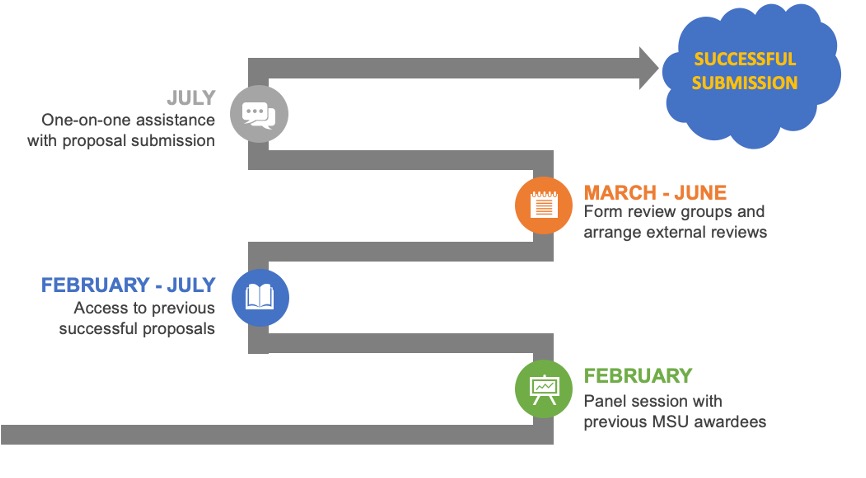Montana State University NSF CAREER Support Program
The goal of the program is to provide NSF CAREER grant applicants with mentoring connections, examples of grants, and create a peer support community to enhance their likelihood of success. The program consists of a workshop with previous awardees, access to successful proposals, review group opportunities and proposal submission support.

Figure 1. Diagram of the process for those submitting an NSF CAREER proposal. February - panel session with previous awardees. February - July - Access to previous successful proposals. March - June - Form peer review groups and arrange external reviews. July - Assistance with submission.
Orientation and Overview – Panel Session
In February each year, the Center for Faculty Excellence coordinates a 1 ½ hour event that features panelists who received awards in the previous two years and a faculty member who has served as a reviewer of CAREER awards. The facilitator presents an overview of the differences between the CAREER and other NSF grants using materials from the NSF CAREER webinars. The panelists answer questions such as “How did you integrate education and research?” or “How did you propose to measure outcomes for research, education, and broader impacts?” The attendees ask questions and at the end of the 60 minutes, the panelist move out onto round tables and meet in small groups with the potential grant applicants. This format allows general questions to be asked in a large group format so that everyone hears different sides of the questions and then follow-up with more specific questions in the small group discussion.
Proposal Library
Each year, the awardees are asked if they would be willing to share their successful proposal with those who thinking about applying. The project summary and description are stored in a shared drive with “read-only” access. Attendees of the panel session apply for access to the proposals by replying to a survey with their name, email and agreeing to the following statement:
“Please respect the generosity and professional courtesy of our presenters by agreeing that the presenters' shared documents are private, not public documents, and I will not disseminate any of the information shared.”
Review Groups
After the panel session, the attendees and any others that have expressed interest in submitting to the CAREER program are sent an email with information about joining a review group. If they are interested, they are asked for the NSF directorate that they are going to submit to and the title of their proposal. The facilitator then puts researchers together in groups of three or four who are from different departments and submitting to different directorates. Review groups set their own timelines and guidelines but often they meet once a week to review each other’s drafts. The facilitator also arranges for external reviews if requested by applicants. This review group aspect of the program was started in 2019.
Proposal Submission Support
The Center for Faculty Excellence and the Office of Sponsored Programs partner on offering proposal submission support including proposal consultation and review, document preparation, online submission portal support, and/or help with budgets. We also have experts on broader impacts on our campus that are available to help with planning the broader impacts portion of the proposal. Some applicants might take advantage of all types of support and others might only ask for support on specific aspect of the proposal. When a faculty members requests support for submitting a proposal, the facilitator would setup shared folders that outline sections of the proposal.
